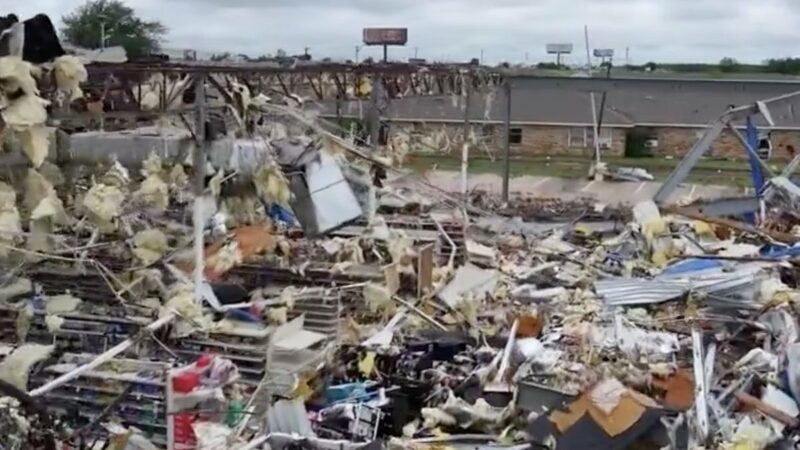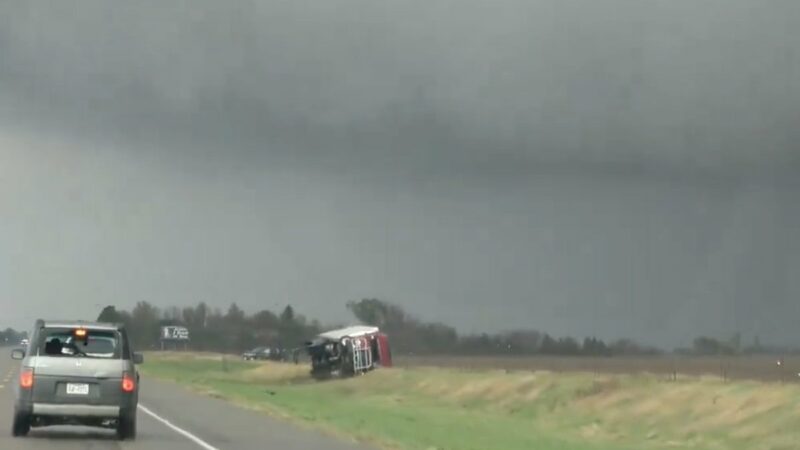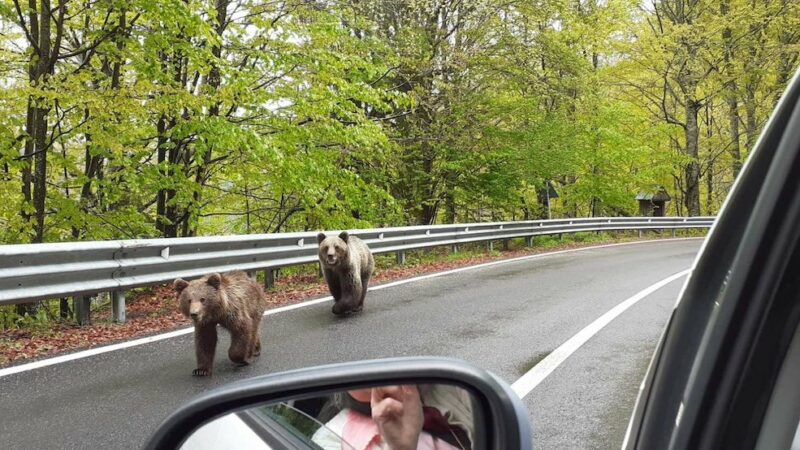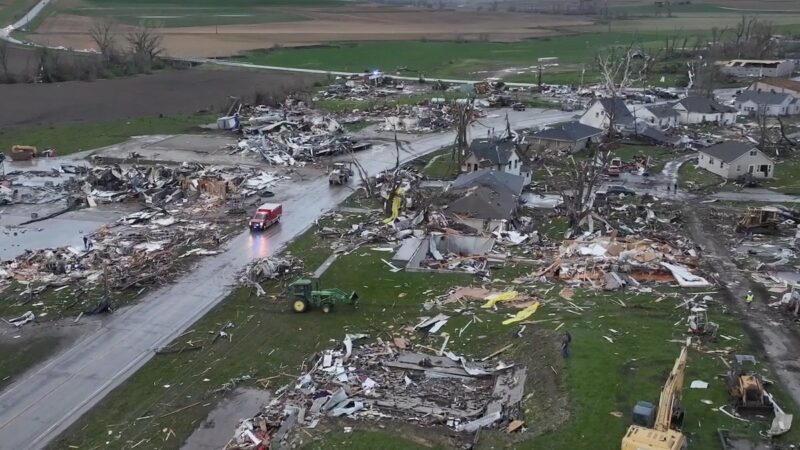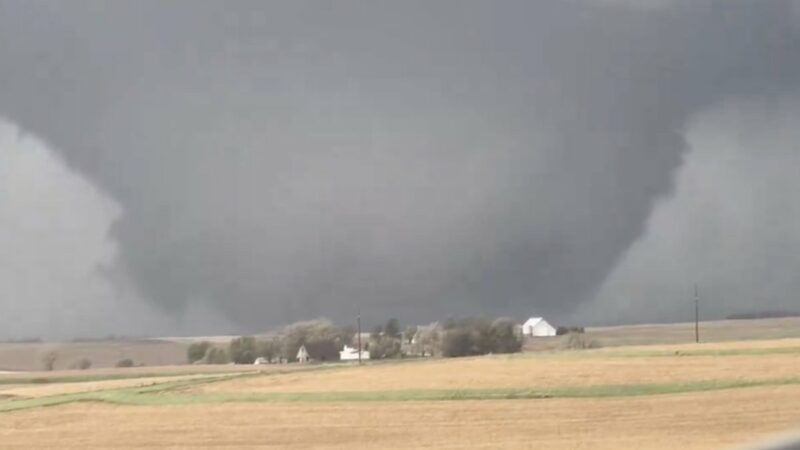The Summer of Cancellations: Why Campgrounds Cancel and What to Do When It Happens to You
That beautiful spot by the river could be just a click away. An alarm on your phone reminds you that reservations open today. Already logged in, you hover over the dates you want to select as the clock changes to the booking time in your time zone. You select, add vehicle information and other details, and pay. You close your eyes and picture your family enjoying s’mores by the fire.
Many campground spots open six months in advance, requiring the planning of your already-demanding life some 180 days in advance. Getting a reservation at that coveted national park, a tent site on the water, or any site at all during a summer holiday can feel like winning the lottery. Strategies for success include trying to log on from multiple accounts (this is frowned upon, but some people still try it), hitting the refresh button multiple times as the clock ticks closer to the reservation window, or simply being flexible with your dates.
If you have the time, checking Recreation.gov often can be rewarding if you chance upon a cancellation. Some campers play the game of booking dates ahead of their intended dates and canceling some of those days later, keeping the dates they want. Whatever the strategy, it honestly takes a little bit of luck.
Once you get the site, you think you’re golden, but sometimes, that’s not the case. Sometimes, it goes like this:
Camp meals have been planned and packing has begun, when an email hits your inbox: “Reservation Cancellation, Location Closed.” A wave of disappointment rushes over you as you realize there won’t be s’mores by the fire at your favorite spot by the river—the one you worked so hard to snag.
The summer of 2023 has seen a rise in campground closures and camp reservation cancellations. Some campers receive notice a few weeks or more ahead of their dates, while others receive an email less than 24 hours before arrival. What has been the cause of the influx of cancellations, and what can you do if your camping trip has been canceled?
Why Campgrounds Cancel
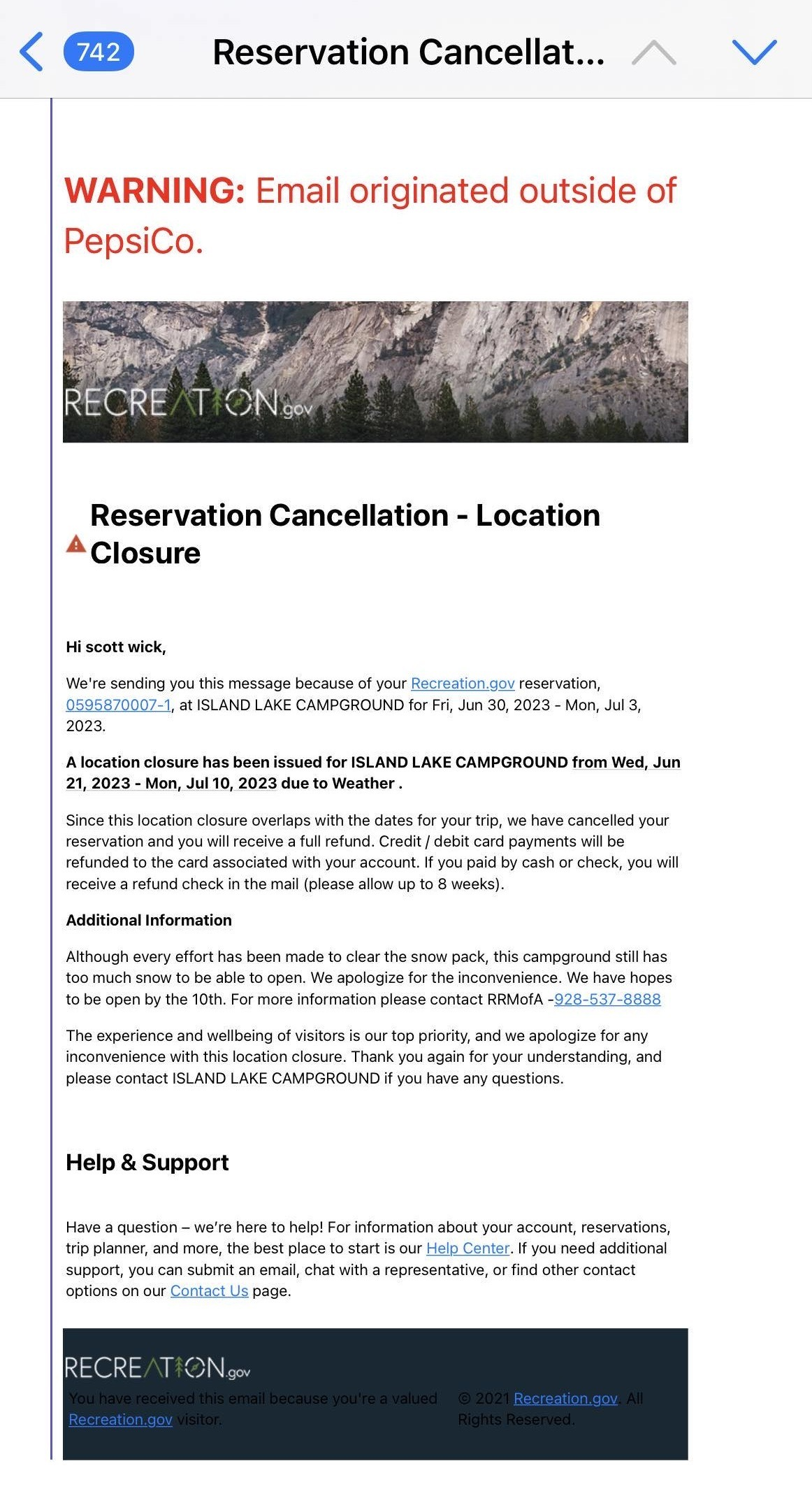
The La Niña winter of 2022-2023 brought larger-than-average snowfall to much of the western United States. This spring, the weather pattern changed to the start of El Niño, bringing continued wet weather and cooler temperatures.
Mother Nature has created a perfect storm this year. Years of dry conditions paired with a wet winter and spring have caused hazardous conditions on trails and at campsites.
Here are some reasons campgrounds have cited for their cancellations this year:
Flooding
The winter of 2022-2023 had the largest recorded winter snowpack for Yosemite, with over 240% of the average snowpack recorded on a benchmark April 1 survey.
The Jacobsma family in California was looking forward to a few days camping in Yosemite in mid-May with many friends. Six months out, they went online at 6:45 AM to book the campsites at 7 AM sharp. “We all were on a group call together and did the countdown to 7 AM to ‘click’ the bookings,” said Rachel Jacobsma. “It worked, and we booked a few campsites on Lower Pines in Yosemite. It’s really a lot of luck and persistence.”
Two days before they were supposed to go camping, however, the Jacobsmas and their fellow group members received a notice from Recreation.gov that snowmelt had flooded the rivers into the Lower Pines Campground. “The feeling of it getting canceled was horrible,” Jacobsma said. “We had been looking forward to this trip for six months and [. . .] it all got canceled. It was very disappointing, and I wish there was more notice from Yosemite.”
Snowpack
Snowmelt has been slow and drawn out in some places, leading to campgrounds and campground roads being covered months after they’re typically clear from snow. For instance, the Island Lake Campground, which rests at an elevation of 10,000 feet on Colorado’s Grand Mesa, typically has a season that begins mid-June, but those dates have been pushed back into July this year.
The Wick Family from Colorado booked a long weekend trip around the 4th of July to paddle and fly fish on the Grand Mesa six months ago. At 6 PM the night before their reservation started, Recreation.gov emailed them about a location closure due to a lingering snowpack. “I have never had a campsite cancel a reservation before,” lamented Alicia Wick. Disheartened, the family was left to try to find a last-minute spot during a major holiday by looking for reservations that other people had canceled. “We couldn’t find another spot, since it was a holiday weekend,” Wick said. “We didn’t want to chance any first-come sites, so we booked a condo.”
Off-season camping begins in early April for the Morefield Campground in southwest Colorado’s Mesa Verde National Park. Record snowfall this past winter pushed the camping season to start one month behind its usual opening dates. The late winter and early spring snowfall has also pushed back projects within the park. The Wetherill Mesa area of the park was supposed to reopen in July to visitors, but it will now be closed all season due to weather-related construction delays.
Tree Removal Projects
In 2022, falling trees killed several people in campgrounds around the U.S., including in the Great Smoky Mountains and Olympic National Park, prompting officials to take a look at how they can prevent these tragic incidents. In places like Oregon’s Deschutes National Forest, continued drought has caused hundreds of trees to become safety hazards.
For instance, over 700 dead or dying trees are currently being removed at the Gull Point Campground and Boat Ramp, closing the area for the season. Full refunds were given to anyone that reserved spots through Recreation.gov. Nearby, the Paulina Lake Campground opening was delayed until late June, while crews continued removing 300 dead trees—a project that began last fall.
Wildfires are another reason for tree removal in some prime camping spots. According to nps.gov, “the cumulative effects of fire suppression and climate change now fuel larger and hotter wildfires.” In 2021, the Dixie Fire consumed 75% of Lassen Volcanic National Park in northern California. The recovery has been steady but slow and continues with the hazard tree removal project, and many trails remain closed to the public.
Reservations for the Butte Lake Campground within Lassen opened in December 2022 for the season beginning June 16, 2023, but weather pushbacks for tree removal meant that the campground was closed past the intended opening date. The opening and closing dates for Lassen’s Manzanita Lake and Summit Lake Campgrounds have also been affected this year by the tree-removal program.
Animal Behavior
On a month-and-a-half road trip through several states, the Kowalewski family, which harkens from near Boulder, Colorado, received an email from Recreation.gov about a partial campground closure at the backcountry Many Glacier Campground in Glacier National Park during their reservation window.
Due to bear activity (human-caused and food-related), no tents or soft-sided camping equipment were allowed from June 27th through July 10th this year. It’s not the first time bear activity has prompted closures or restrictions within the campground, but it often still comes as a surprise when it happens to you.
“There was a moment of panic when we got the email about the campground closure,” said Daniel Kowalewski. “Fortunately, we saw it quickly enough that we could find a backup tent site [at a KOA just outside the park] while some were still available. This trip has given us a lot of experience with booking campsites far in advance,” he added.
Human Behavior
Higher usage and demand have also caused a strain for campgrounds with higher cancellation rates in recent years due to staffing shortages, littering, rising costs, and unsafe behaviors of campers. This year after the 4th of July weekend, the organization Keep Tahoe Blue and The League to Save Lake Tahoe cleaned up 8,559 pounds of trash from six popular beaches around Lake Tahoe as a part of their annual Keep Tahoe Red, White & Blue Beach Cleanup, which started in 2014. Beaches were closed while volunteers cleaned up the massive mess.
What to Do if Your Camping Reservation Gets Canceled
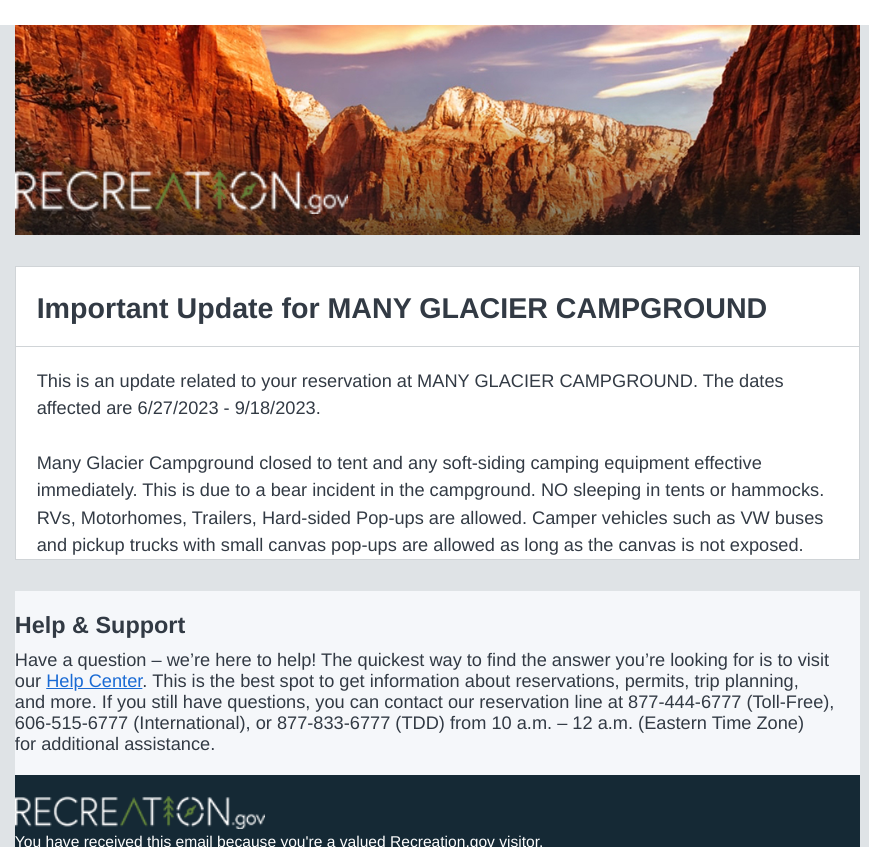
If your campground reservation is canceled due to unforeseen circumstances, begin by reading the details in your cancellation email. Recreation.gov and other booking sites will often include information about refunds in the email, including whether the refund is automatic or if you need to request one.
Some campgrounds will give you the option to cancel with a full refund if you can’t meet the parameters of the closure—for example, when Many Glacier Campground closed to tents and soft-sided campers but not to those with hard-sided camping equipment.
David Barak, public affairs specialist for the National Park Service, makes these recommendations:
- Always have a plan B or C in mind, in case your campsite reservation is canceled.
- If your campground reservation is canceled, check out “Campgrounds Nearby” to see other locations in the area and region that may have sites for your desired dates.
- There may also be dispersed camping options in the arena, if you do not require amenities found in developed campgrounds. These locations don’t require reservations, and they are free. Before departing for a dispersed camping location, contact the managing agency to understand local conditions.
How to Snag a Last-Minute Campsite
While disappointing, hope is not lost if you receive a campground cancellation notice. If your travel plans are flexible, you may be able to get a spot for a later date. If your dates and location are set, look for alternative campgrounds in the area or alternative lodging options, including cabins. Even if you don’t end up in the national park you want to be near, there are often close-by camping options that’ll still allow you to enjoy the park.
Thanks to the power of social media, Facebook groups for camping are reliable places to look for last-minute cancellations or to ask if anyone has any spots for sale with your wants (location, dates, etc.). Groups are often organized locally, state-wide, or location specific.
“My advice would be to join Facebook groups catering to campground cancellations. People can post on there about their cancellations so that others can snag them,” said Jacobsmba.
Websites and apps like Campnab and Campflare allow you to put in location, site type, and dates for campsites. Notifications are sent via text and email when a cancellation that meets your parameters opens up.
“Another tactic is just go on Recreation.gov or other camping websites and just click refresh repeatedly and be persistent. Usually, something will pop up if you’re flexible with where you want to camp,” Jacobsma added. This tip worked for her when her family’s Yosemite reservation was canceled at the last minute, and she was able to pick up a spot at Lake Cachuma instead.
Campground closures are a reality, and this summer of cancellations may become more normal thanks to factors like climate change and crowding. Going in being flexible and having a contingency plan will help lessen the blow if it happens to you. With a bit of luck and persistence, you will hopefully still be able to grab a last-minute spot elsewhere next time a campground closure derails your plans.
Have you experienced a campground cancellation? Tell us below!
